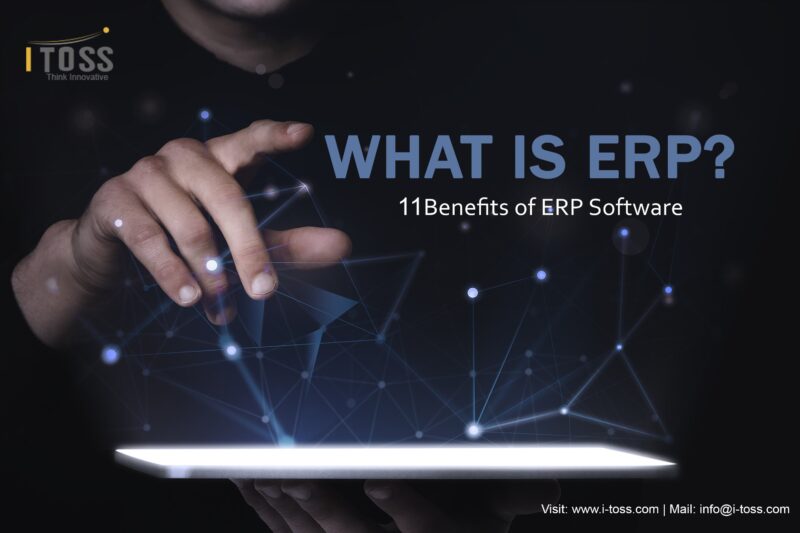What is ERP? 11 Benefits of ERP Software
Enterprise resource planning, or ERP, is the process of gathering and managing business data from various departments using dedicated software to manage and integrate their core business processes.
ERP software provides organizations with an integrated, Streamline business process, view of their core business processes, often real-time, easily accessible through one centralized system with a single click.
The benefits… well, we’ll go into them shortly!
Organizations use ERP tools to streamline their business operations to get Accurate data Decision making includes supply chain, accounting, human resources (HR), e-commerce, customer relationship management (CRM), and risk management to improve productivity.
ERP solutions come in all shapes and sizes and can be customized as per the requirements, & used by larger manufacturing organizations with bigger budgets, ERP software is now increasingly attractive to ‘midmarket’ medium, and small businesses to manage their business.
- Increased Productivity
ERPs are designed to be easy-to-use systems that unify one major benefit of ERP software is automation, Order & Inventory Management, ranging from invoice generation to marketing automation. This frees up employees’ time to be more productive in other areas and ensures important processes don’t get overlooked with real-time information. Moreover, by having one central repository accessible by all departments, an ERP removes the need for tedious manual processes by faster response time such as repetitive data entry across multiple systems. By implementing ERP solutions accuracy of your data will also improve too!
- Reduced Operational Costs
All over increased efficiency of operational processes, an ERP can help cut costs and increase profitability across all departments in your organization, from manufacturing to finance with faster response times.
Just unifying your IT systems is normally a cost-saving exercise in itself, reducing spending on multiple licenses, support fees, infrastructure, and admin resources to manage it all.
If you’re a manufacturer, an ERP will provide you with a new level of data to proactively and improve business efficiently & manage business operations, oversee inventory, prevent disruptions and delays, and make quicker decisions.
- Integrated Information
With an ERP, the information business will be automated instead of manual routine tasks and gathered from across all the departments is consolidated into a single source. ERP system makes it easier to share consistent, unique, and accurate data.
As a result, coordination between departments becomes more consistent. Having access to a wealth of accurate, up-to-date data, aids high-level business processes such as forecasting and subsequent planning and decision-making more efficiently.
- Competitive Advantage
ERPs can be expensive. Obtaining a modern ERP system standardized processes, however, can put you ahead of the competition simply by having a level of intelligence that they don’t. Better reporting tools with real-time information & a combination of real-time data, coupled with increased agility, enable you to hone in on untapped competitive advantages, drive product development, and respond quickly to change.
- Flexible Systems
Cloud ERP systems enable workers to operate remotely. Moreover, an ERP system can be configured to accommodate workforce changes and more users as the business expands, thus aiding scalability and can help you better analyze spending and purchases over time.
During ERP implementation, it is important to factor in flexibility, customization according to modules, and mobility for when the business scales in the future. These systems also allow room for adding more users as growth occurs to improve business efficiency.
- Easier Reporting and Planning
An ERP suite means a single unified reporting system to make work easier. A single source of truth, better access to customer information, and accurate, real-time data can be generated and shared without the intervention of an IT expert. Employees can generate reports, establish problems, and offer instant solutions to Gain efficiency. Interdepartmental databases are customized to allow the integration of information for easy access to make transparency through the business.
- Enhanced Data Security
ERP systems spanning across business functions have controls on who can view and edit sensitive information Leading ERP providers to have security resources that’s why data security is the heart of ERP. ERP data security is a top priority with leading ERP so merging information into a single repository, whether on-premise or in the cloud, shores up security compared with scattered sources on disparate systems.
Data can be distributed across multiple servers in several locations & Improved data security also helps with regulatory compliance and the aforementioned built-in reporting functions can help to reduce auditing costs.
- Improved Customer Service
ERP solution can provide real-time access to information and automation to customer service and sales teams to quickly access customer data so they have an easier time addressing customer concerns and tracking experience history ERP solutions can automatically back up data & In addition, an ERP solution can automatically back up data.
ERP systems can often immediately analyze and correct the problem and implement an update automatically so 55 percent of customers are willing to pay more if a good experience is guaranteed.
- Department Collaboration
ERP solutions make it possible for different departments to remotely share system-integrated information from a single platform.
An ERP solution provides a great way to protect sensitive data further, suppliers can track stock balances and plan ahead of time, streamlining your supply chain operations.
- Higher management performance
ERP solutions serve as a data center that establishes links between all aspects of enterprise activities that require management, including human resources, production, sales, customer support, inventory, and supply. With the help of computer technologies, ERP software enables automatic data handling in the fastest and most effective way to transform your business process.
- Scalability and flexibility
Another inherent benefit of ERP software is determined by its modular structure that allows adjusting its scale according to current needs and conditions. Thanks to this feature, a resource planning system easily adapt to the expansion or reduction of the company on every level.
How to Choose the Right ERP Software
The right ERP software has the potential to be automated, transform & streamline your business processes to improve accuracy, but there are risks involved. Before any ERP install into a business occurs, several factors have to be considered for a successful ERP implementation to take place.
Here are some key considerations.
Conduct a Technical Fit Evaluation
Evaluate the technical fit ERP as per your requirements- as they’ll be integrating with your current systems, your ERP solution should be compatible with your existing technological infrastructure. If you’re unsure, it’s worth getting expert advice or risk-compromised security and costly maintenance of your new system in the future so you can focus on critical business requirements.
Understand Acquisition Cost
ERP vendors sometimes charge extra for services on top of the basic package price so You should look out for additional pricing variables such as:
- Software maintenance
- Implementation cost
- Hardware upgrades charges.
Bear in mind that cheap ERP software may & look for a partner that has deep industry expertise also pose threats to your data security.
Keep Options Open
There are a lot of ERP software options out there with varying degrees of functionality and security also avoid making product purchases based on brand names.
Conduct a Process Review
Document and define your current business processes, pain points, strengths, and other processes that your ERP solution should address. Determine which workflows you’d like to optimize and how you want the business to look like in the future understand how software solutions can align with current infrastructure.
Have a Realistic Implementation Plan
An ERP is a big and comprehensive system and will take a while to configure. So, the implementation period is an important aspect to consider on top of other factors like cost and end-user acceptability and cover all the modules as per the requirements. It’s important to develop a comprehensive project plan any implementation plan should consider a grace period for data migration.
Have a Clear Forecast of Potential Benefits
It’s essential to have useful information in other to make the right decision to increase profitability by reducing costs with the right ERP software. It is also important to measure this metric before making a purchase so you can improve reporting capabilities.
Next steps
We’ve shown you the benefits of ERP software with highlights of each system’s core features & standout capabilities and provided advice to help with choosing the best option for you.
If you feel like ERP might be right for you, and want to get and want to install it leave a comment below. Share knowledge with other industry professionals so they and improve their business processes.
For help getting your tools and data organized, Contact us To Organize All Your Business Processes.






Leave A Comment